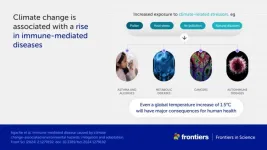(Press-News.org) Highlights:
Colorectal cancer is associated with a disrupted gut microbiome.
About 40% of people with colorectal cancer have a mutation in the KRAS gene.
Researchers in China connect the 2 in a new study.
Their findings identify distinct microbial signatures in patients with and without KRAS mutations.
The work points to a potential noninvasive biomarker for determining a person’s KRAS status after a colorectal cancer diagnosis.
Washington, D.C.—For about 40% of people diagnosed with colorectal cancer (CRC), the tumor carries a mutation in a gene called KRAS. Many of those mutations have been linked to shorter survival and more aggressive forms of disease. The onset and growth of CRC tumors has also been associated with imbalances in the gut microbiome, but the interplay between these 2 characteristics—gut dysbiosis and KRAS mutations—remains poorly understood.
In a study published this week in Microbiology Spectrum, an open access journal published by the American Society for Microbiology, researchers in China have identified microbiota signatures associated with KRAS mutations in people diagnosed with colorectal cancer. The findings suggest that gut microbes may serve as a kind of non-invasive biomarker for identifying subtypes of CRC and may inform personalized approaches to therapy, said Zigui Huang, a medical student at Guangxi Medical University Cancer Hospital who worked on the study.
The study was led by oncologist Weizhong Tang, M.D., at the same hospital, whose research focuses on harnessing molecular knowledge of CRC for better diagnosis and treatment of the disease. “Our new work contributes to the growing body of evidence highlighting the significance of microbiota-driven mechanisms in cancer pathogenesis,” Tang said.
Nearly 2 million people are diagnosed with colorectal cancer each year worldwide, and more than 900,000 die from the disease, according to the World Health Organization. Globally, it’s the third most common cancer and the second leading cause of cancer-related deaths. Previous studies have connected gut bacterial imbalances to the formation and spread of CRC, suggesting that a closer study of the gut microbial populations in the context of CRC could yield new insights about diagnosis and treatment.
“Understanding the specific associations between different types of KRAS mutations and CRC is vital for several reasons,” Huang said. Those include elucidating the molecular mechanisms that drive the development of CRC and identifying biomarkers for diagnosis and disease progression.
For the new study, the researchers analyzed stool samples from 94 individuals with CRC using 16s rRNA sequencing. Out of the 94, 24 had mutations in the KRAS gene and the rest had the “wild-type,” or non-mutated, form of the gene.
Sequencing revealed 26 different types of gut microbiota that were present in one group but not the other. The genera Fusobacterium, Clostridium and Shewanella were all abundant in the mutant group. Fusobacterium is a Gram-negative microbe found in the GI tract and the oral cavity, and previous studies have connected it to the development of CRC. All 3 of these, the researchers noted, should be considered as non-invasive biomarkers to determine a patient’s KRAS status.
Bifidobacterium and Akkermansia were abundant in the samples from patients without a KRAS mutation. Bifidobacterium is a probiotic, and Akkermansia has shown some probiotic activities in previous studies, including suppression of pro-inflammatory factors in the colon. Based on this finding, the researchers speculate that the presence of these bacteria may reduce a person’s chance of developing a KRAS mutation and, to an extent, slow the progression of CRC.
In the same paper, the researchers introduced a machine learning model that could use this information to guide personalized treatment recommendations based on microbiota signatures. However, Huang said, the model requires data from a larger cohort to improve its efficacy. The group plans to conduct larger studies to validate the findings and better understand the significance of the gut microbiota they’ve identified, in hopes of improving treatment for CRC patients.
“This study aligns with our broader research focus on understanding the intricate interplay between genetic mutations, the tumor microenvironment and gut microbiota in colorectal cancer,” Tang said.
###
The American Society for Microbiology is one of the largest professional societies dedicated to the life sciences and is composed of 36,000 scientists and health practitioners. ASM's mission is to promote and advance the microbial sciences.
ASM advances the microbial sciences through conferences, publications, certifications, educational opportunities and advocacy efforts. It enhances laboratory capacity around the globe through training and resources. It provides a network for scientists in academia, industry and clinical settings. Additionally, ASM promotes a deeper understanding of the microbial sciences to diverse audiences.
END
Microbial signature of colorectal cancer-associated mutations identified in new study
2024-04-04
ELSE PRESS RELEASES FROM THIS DATE:
Discovery into how chronic lung conditions affect children’s immune system
2024-04-04
Researchers have made a breakthrough into how two chronic respiratory diseases in childhood affect the immune system, paving the way for better treatments.
The research, led by Murdoch Children’s Research Institute (MCRI) and published in Mucosal Immunology, has found suppurative lung disease and wheezing have the same inflammatory profiles despite their differing symptoms.
MCRI Dr Melanie Neeland said while suppurative lung disease and wheezing were common in children, due to a poor understanding of the underlying mechanisms, treatment options were limited and disease recurrence ...
Around 10% of deaths from coronary stenting, balloon angioplasty are preventable
2024-04-04
Each year more than 500,000 Americans undergo percutaneous coronary intervention, or PCI, a minimally invasive procedure to unclog the arteries that feed the heart.
While PCI, which includes both angioplasty and stenting, is one of the most common operations in the world, it does carry a small (about 1-2%) but significant risk of death. Around 10% of all deaths following percutaneous coronary intervention are potentially preventable, a study led by Michigan Medicine finds.
The results are published in PLOS ONE.
“Deaths in the hospital after PCI are rare and mostly occur in patients ...
Click, click, boom—150 new molecules
2024-04-04
Cold Spring Harbor Laboratory (CSHL) chemists have created a new collection of molecular compounds and begun testing them as potential leads in the search for new drugs. Among these molecules, they found several that show promise for development as antibiotics and cancer therapies. Sounds like a eureka moment? Well, sort of. But it’s more a case of hard chemistry made simple.
The new compounds were synthesized using an efficient new way of linking molecules together, developed in the lab of CSHL Professor John Moses. Moses calls his innovative process Accelerated SuFEx Click Chemistry (ASCC). ...
Electric vehicles are lowering Bay Area's carbon footprint
2024-04-04
An extensive CO2 monitoring network set up around the San Francisco Bay Area by an atmospheric chemist from the University of California, Berkeley, has recorded the first evidence that the adoption of electric vehicles is measurably lowering the area's carbon emissions.
The network of sensors, most of them in the East Bay, is the brainchild of Ronald Cohen, UC Berkeley professor of chemistry, who envisions inexpensive, publicly funded pollution and carbon dioxide monitors widely distributed around urban areas to pinpoint emission sources and the ...
SynGAP Research Fund (SRF) awards collaborative grant to advance research of SYNGAP1 related disorders in adults
2024-04-04
Toronto, CANADA & Rotterdam NETHERLANDS – March 2024 – The SynGAP Research Fund 501(c)(3) today announced a grant to Dr. Danielle Andrade, Dr. Miles Thompson, Dr. Ryan Yuen, Dr. Rogier Kerssebook, and Dr. Anatoljevna Anna Kattentidt to support research on SynGAP-Related Disorder (SRD) in adults. SRD is a rare neurodevelopmental disorder that causes severe intractable epilepsy, and intellectual disability, and is one of the leading genetic causes of autism (1,2).
Dr. Andrade’s team recently published the only research on SRD in adults ...
With the planet facing a 'polycrisis', biodiversity researchers uncover major knowledge gaps
2024-04-04
A scientific review has found almost no research studying the interconnections across three major threats to planetary health, despite UN assessments suggesting one million species are at risk of extinction, a global pandemic that resulted in over six million excess deaths, and a record-breaking year of global temperatures.
“When we began to look into it, we had suspicions the number of studies would be low, but not that low,” says Dr. Jonathan Davies, a researcher with University of ...
Liberalization of medical marijuana and mental health in the USA
2024-04-04
The approval of marijuana for medical use has had little effect on the mental health of the general population in the US. But legalization for therapeutic purposes does benefit those for whom it is intended. This is the conclusion of a study by researchers at the University of Basel.
In the US, access to marijuana has been facilitated in most states since the mid-1990s – whether through medical clearance or through decriminalization of recreational use. However, liberalization is still controversial, and the effects on the well-being of specific groups and the therapeutic value ...
Scientists call for urgent action to prevent immune-mediated illnesses caused by climate change and biodiversity loss
2024-04-04
The ecosystems we live in don’t work the way they used to — and that’s bad for our health. Climate change, pollution, and falling biodiversity are all damaging our immune systems. The lack of positive environmental exposures to build the strength of our immune systems, and the increasing negative exposures which attack those systems, are combining to cause a dramatic rise in immune-mediated diseases like asthma and cancer. Measures to protect against this could have a very powerful return on investment: an estimated $1 spent on climate change mitigation saves $3 on healthcare costs. A global ...
Scientists identify rare gene variants which confer up to 6-fold increase in risk of obesity
2024-04-04
A study led by Medical Research Council (MRC) researchers has identified genetic variants in two genes that have some of the largest impacts on obesity risk discovered to date.
The discovery of rare variants in the genes BSN and APBA1 are some of the first obesity-related genes identified for which the increased risk of obesity is not observed until adulthood.
The study, published in Nature Genetics, was led by researchers at the MRC Epidemiology Unit and the MRC Metabolic Diseases Unit at the Institute of Metabolic Science, both based at the University ...
Adult fish struggle to bounce back in marine protected areas
2024-04-04
Age matters when determining how to protect life in the ocean; every population needs a strong cohort of adults to produce the next generation. But many marine protected areas (MPAs) are falling short of their most basic purpose: to rebuild struggling fish populations. In a new study published April 4 in Global Change Biology, scientists looked at the age breakdown of reef fish in marine protected areas for the first time. They discovered in almost all of them, adult fish populations have either flatlined or declined.
“Adult fish are really important,” said ...



